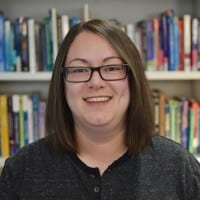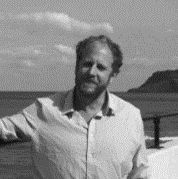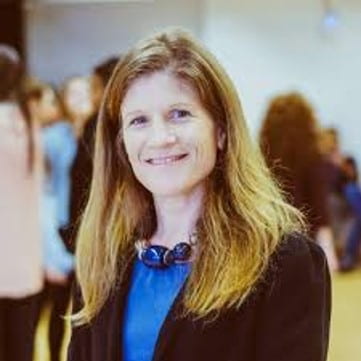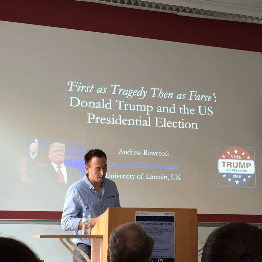Vice Chancellor’s Award
2019 Awardees
At the University of Lincoln, the Vice-Chancellor’s Public Engagement with Research & Excellence awards recognise staff and students who have made outstanding contributions to engaging people and communities beyond the university in new knowledge, invention and discovery.
Vice Chancellor’s Awards for Public Engagement with Research
Kay Ritchie
School of Psychology

Kay strives to take research off-campus and into the community, both engaging people in her research and providing opportunities for colleagues to do the same, such as organising the ‘Community Lab’ at Skegness Aquarium. In 2019, Kay initiated and headed up the organisation of the first Pint of Science at Lincoln, supporting both a volunteer organisation team and speakers in sharing their research. Kay takes every opportunity to share her own research, for example at Eleanor Glanville Centre’s ‘Newton Academy’, at ‘Young Carers’ Day’ events and on BBC One’s ‘Crimewatch Roadshow’. Kay looks for these events to feed back into her own research, with her current ‘Facial recognition in the criminal justice system’ project having been inspired by a discussion at one such event.
Daniel Came
School of History & Heritage

Since 2017 Dr Came has organised the Lincoln Philosophy Salon, a monthly talk series that brings researchers to the Cardinal’s Hat, Lincoln to present their work on an extensive range of Philosophy topics. Each event attracts 50-60 people, with 100+ more joining via a live online stream. The events, now co-organised with a team of public volunteers, offer opportunities for all to hear researchers from across the country give talks followed by discussion with opportunities to engage with speakers, give opinions and ask questions in an engaging, innovative, confidence-building setting. Dr Came has also presented and developed his own research on nihilism and life-affirmation through sustained dialogue with members of the public at the Salon.
David Nelson
School of Health & Social Care

David’s research looks at a comparison between patients in rural and urban settings of cancer survivorship, collaborating with Macmillan Cancer Support. Through this research he has engaged with patients, experts, care-providers and offered support for additional projects at every possible opportunity and with outstanding empathy and professionalism; fostering partnerships with NHS experts, Macmillan managers and cancer survivors. David’s research is shaped and informed by patients, experts and partners including a Partnerships Steering Group he initiated and organised, and he ensures emerging findings are shared with services and patient self-help groups so that results are impactful, new perspectives are shared and innovation supported.
Health Advancement Research Team (HART)
Interdisciplinary Team

HART researches a wide range of health, sport, exercise and body-related issues. HART has undertaken in-depth research into food health and economy in Lincoln, making key proposals to reconnect people with food; to tackle obesity, food poverty, environmental quality; and improving the local economy. HART produced the ‘Lincoln Food Strategy’ in 2016, presenting its findings for all to understand and subsequently establishing the Lincoln Food Partnership Board, with representatives from across the community, private and public sectors, Church and University, to implement the strategy. The Board have catalysed different parts of the local food system coming together, with actions such as helping to set up Mint Lane Café which provides hot meals to those in food poverty using supermarket food ‘waste’. This has overall led to Lincoln becoming a ‘Sustainable Food City’ .
Public Engagement with Research Excellence Awards
Anna Tarrant
School of Social and Political Sciences

Dr Tarrant’s research on ‘Responding to Young Fathers in a Different Way’ aims to counteract negative perceptions of young fathers. This research has used innovative approaches to co-produce research with young fathers, and co-disseminate new knowledge and evidence to practice partners from the public, private and voluntary sectors and young fathers themselves. Through these approaches, including action research, this project has informed national family policy, changed professional cultures, and enhanced the lives of young fathers and their families. This has included implementing new support models such as the ‘Young Dads Collective which empowers young fathers as experts by experience; supports and trains them in advocacy work on behalf of other young fathers; and to engage in practitioner training and consultation.
Ananda Breed
School of Fine & Performing Arts

Professor Breed’s practice-based research combines interdisciplinary arts, conflict analysis, and psychosocial wellbeing. Her recent projects have engaged young people in designing performances, discovering how this offers dialogic opportunities for young people. This research has engaged artists, civil society organisations, NGOs/IOs and government institutions to shape the national curriculum in both Kyrgyzstan and Rwanda. Breed’s work has resulted in changes to international conflict prevention practices; access to and participation in political processes; school curricula and opportunities for young people; the inspiration, creation and support of new forms of performance art; and the integration of participatory practices as a teaching and learning method in the UK and abroad. Locally, Breed’s focus on local issues and stories contributed to the design and delivery of a production entitled Being Human devised by Drama students from Lincolnshire archive material.
Andrew Rowcroft
School of English & Journalism

Dr Rowcroft recently set up and ran a PEARL-funded short course in American Literature using a community space at Eastgate Tennis Club, Lincoln. Each monthly session discussed a different book, introducing literary theory in an accessible manner. The course was designed to be supportive and open to all. The structure of the course offered the chance for engagement both before and after the sessions with opportunity for discussion throughout, building confidence and critical skills. The informal nature of the session encouraged all to be relaxed and feel able to share opinions and interpretations of each book. The feedback has shown that this series has inspired and encouraged attendees to continue developing skills and knowledge, including attending talks, plays, film screenings and further courses, as well as resulting in the venue developing an unused meeting room into a learning space where other courses have since taken place.
Pint of Science 2019 Team
Interdisciplinary Team

Pint of Science is an annual 3-day international festival bringing researchers to local pubs to engage the public through exciting talks and activities. On May 20th-22nd 2019, for the first time, a team of volunteers from across the University brought Pint of Science to Lincoln pre-faced with a Pint of Science ‘Evening with An Astronaut’ event with Mike Foale earlier in the year. The team organised everything from recruiting and supporting speakers, researching and selecting venues and promotion through to event management during the festival; building a buzz across the University with their enthusiasm. The team facilitated 20 researchers giving 18 talks across 3 venues for 3 nights, with over 280 attendees across the festival. By bringing Pint of Science to Lincoln, the team inspired and engaged the public through interactive talks; strengthened links between the University and local people and venues; and supported colleagues in engaging people in research.